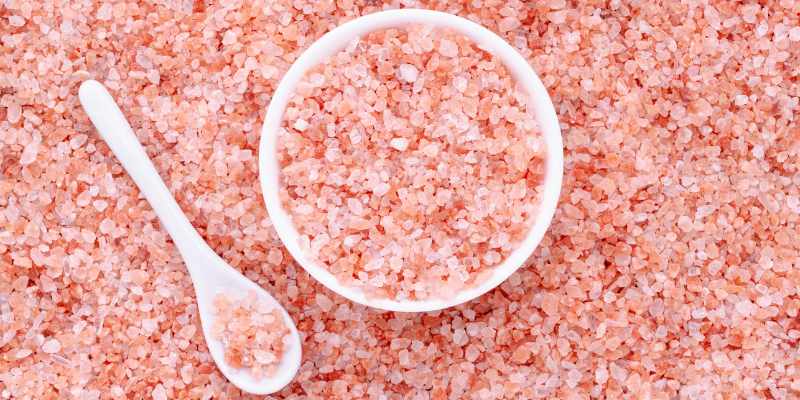The 5 Best Salt Tablets for Runners | How Much Salt to Add to Water for Hydration
If you have read enough of our blog posts, it’s likely you are aware that plain water is not the “end-all be-all” when it comes to hydration. Electrolytes are also key to avoid dehydration while running.
Electrolytes are the foundation of most of the essential functions of our bodies, especially in people that are physically active! Without electrolytes, we wouldn’t be able to perform critical tasks like maintaining proper hydration, contracting our muscles, allowing nutrients into and waste out of our cells, or keeping an ideal acid/base balance.[1]
Now, for more info on electrolytes and the best electrolyte water brands, I’m going to direct you over to our recent article that talks all about the 17 Best Electrolyte Water Brands.
But first, please stick around to learn more about salt/sodium specifically and everything you need to know about salt tablets for runners! In this article, you can expect to find info about: the best salt for hydration, how much salt to add to water for hydration, Himalayan salt for runners, if salt hydrates you, and how many salt tablets you need during a marathon.
So c’mon – in the spirit of sodium, grab your favorite salty snack, and let’s get to talking about salt!!
Table of contents
- What is Salt?
- Importance of Sodium for Athletes
- What is the Best Salt for Hydration?
- Is Himalayan Salt for Runners a Good Idea?
- How Much Salt to Add to Water for Hydration
- How Many Salt Tablets During Marathon Races Should You Consume?
- The Best Salt Tablets for Runners List
- Electrolyte Tablets
- References
What is Salt?
We know that salt is delicious and a great addition to meals/snacks (or at least we think so), but what IS salt?
Salt is made up of two minerals: ~40% sodium and ~60% chloride. Sodium and chloride are both electrolytes as well, and salt typically serves as the main source of those electrolytes in the body.
Between sodium and chloride, they are responsible for things like nerve and muscle function, blood pressure and pH maintenance, stomach acid production, control of nutrients coming in and out of the cells, and regulation of water and fluid balance.[2, 3, 4]
As you can imagine, it’s quite crucial for us to get enough salt in our diet to keep our bodies functioning. However, too much salt can also be a health risk, as excessive sodium intake can lead to high blood pressure and issues with your heart and kidneys![2]
Importance of Sodium for Athletes
In the section above, we touched on why sodium is important in the body in general, but it is even more important for active individuals! Why? Because sweat is a major source of salt loss! Have you ever finished a workout and felt a gritty texture, seen a white sheen on your skin and possibly even white streaks on your clothing? That’s salt!!
Too little sodium can also impact your athletic performance. Sodium helps maintain your electrolyte (blood salt) concentrations which helps keep the blood flowing and ideal pressure in your veins and arteries. On top of that, sodium helps stimulate thirst and decreases urine production, ultimately reducing fatigue, muscle cramps, and the risk of other kinds of medical problems that may be associated with endurance sports, such as running.[5]
Because of this, there are many salt tablets for runners to help obtain enough sodium before and during long runs.
But now, are you wondering, what is the best salt for hydration?
What is the Best Salt for Hydration?
There are actually quite a few varieties of salt on the market. The salt you’ll typically find at restaurants or in your pantry is good ol’ sodium chloride, or “table salt” that we mentioned earlier.
This is the most common form of sodium in the diet and is also likely what you’ll find in salt tablets. BUT, are there better options out there? To be honest – yes.
In regard to how table salt functions in the body, it helps with water and fluid balance, but it is highly processed, meaning it has been stripped of naturally-occurring minerals and often contains a variety of chemicals.
Because of this, we often recommend a more natural salt that isn’t nearly as processed and still contains crucial minerals essential for achieving and maintaining optimal health.
Our Favorite Salt

Our personal favorite is Redmond’s Real Salt. Mined naturally in Redmond, Utah, this salt is unrefined and still contains all naturally occurring minerals like calcium, potassium, phosphorus, and zinc without any added chemicals! Packing more of a nutrient punch, this is our go-to for cooking, adding to hydration beverages, and more!! Himalayan and Celtic salts are also great options.[6]
Now, for financial and convenience reasons, table salt is a fine option, so please don’t feel like you need to throw it out and rush to go buy a new kind! But we also wouldn’t be doing our job if we didn’t inform you of better options.

Is Himalayan Salt for Runners a Good Idea?
We talked about how unrefined salts, such as Himalayan salt, are our preferred forms of salt. But, is Himalayan salt for runners a good idea? Yes!!
As I mentioned above, since this salt still contains all its naturally-occurring minerals, it contains more than just sodium and chloride. This is beneficial because while sodium is very important, it’s also crucial that you maintain ample stores and a good balance of other minerals – especially those electrolytes we always harp about!!
So, using Himalayan, Redmond, or Celtic salt is a great way to ensure you are getting enough sodium and electrolytes as a whole!
How Much Salt to Add to Water for Hydration
We have talked all about the importance of salt and which ones to reach for, so now let’s touch on how much salt to add to water for hydration. You might have seen this coming…but the amount of salt you need depends on various things. Gender, stage of the menstrual cycle (for those who menstruate), how much you sweat, the weather/temperature where you are exercising, other electrolytes being consumed at that time, etc.[7, 8]
Research shows that you should replenish sodium losses when you exercise for longer than 2 hours, are in a hot climate, or when your sodium losses are high (>3-4g Na+). This same study also found that between basketball, baseball, soccer, American football, and endurance athletes, football players and endurance athletes (runners) experienced the highest whole-body sweat rate (WBSR) and rate of sweat Na+ losses (RSSL).[7]
This research is important to you as a runner as it found that you will need more sodium than other types of athletes!

Recommended Amounts
Again, it’s nearly impossible to provide a straightforward answer to how much salt you need to add to your water since it is impacted by multiple factors listed above. However, research states that a general rule of thumb is to add 3.2g (0.5 teaspoons) of table salt to every 960mL (32 fl oz) of a sports drink.[9]
A different study recommends 500-700 mg/L of fluid to reduce the risk of low blood sodium during long-duration exercise.[9]
Slightly higher amounts of sodium and other electrolytes are needed in conditions of high heat (>77℉) and/or humidity (>60%).[9]
Recommendations for Female Athletes
Your phase of the menstrual cycle can also impact how much sodium you need.
During the second half of the menstrual cycle (luteal phase), your body pushes out more sodium because you have higher progesterone levels. Because of this, you need more sodium and additional electrolytes.[8]
While salt tablets are a great tool, the best way to combat this is to prep ahead of time by adding table salt to your pre-run meals to allow your body to absorb more fluid and water.
For women, it is often better to prepare this way than to consume super high amounts of salt via salt tablets on the course.
How Many Salt Tablets During Marathon Races Should You Consume?
Our FWDfuel nutrition team is often asked how many salt tablets to use during marathon training runs. However, again…..this isn’t a simple question to answer.
Similar to the above, the answer to this question depends on a variety of factors. In order for us to be able to answer the question of how many salt tablets during marathons, we need to know things like:
- What is the salt content of the brand of salt tablet for runners you’re using?
- What is the temperature and humidity of the race you will be running in?
- What is your speed? (Slower runners spending more time in the heat will likely lose more fluids – this leads to more salt tablets for runners)
- Are you a heavy sweater?
- Have you had a sweat analysis?
Slower runners and/or heavy sweaters in a hot/humid environment will obviously need more salt tablets than others. Additionally, if your salt tablets have a lower salt content, you may need to consume a higher quantity.
To get more guidance on this, we recommended meeting with a nutrition coach who can help interpret these factors and create a hydration plan for your personal needs! In addition to a hydration plan, a nutrition expert can also help assess if you might benefit from additional supplements such as UCAN superstarch or NAD-boosting supplements to help support energy and endurance while exercising.

The Best Salt Tablets for Runners List
Ahhhh..at last. We have made it to our list of the best salt tablets for runners.
If you do a quick Google search, you will see that there are tons of different salt tablet brands out there – each of them with their own marketing tactics to make it seem like they are the best possible choice.
You also might have noticed that many salt tablets contain minerals besides the sodium chloride that is usually in salt.
You’re right; it’s overwhelming! BUT – that is where we come in. We looked into the nitty-gritty details and have compiled a list of our favorite salt tablets (or salt tablet substitutes) for runners, so you don’t have to!
Let’s get into it!
Safrel Sodium Chloride Tablets
These unflavored salt tablets are made of just sodium chloride and contain no other minerals. Safrel sodium chloride tablets would be ideal for runners who are heavy sweaters but also might lack some salt in their diet, ultimately requiring more supplemental sodium before a run to avoid becoming hyponatremia (low concentrations of sodium in your blood).
With 1g of sodium chloride per tablet (~394 mg of sodium), these are a quick and easy way to replenish sodium stores before starting that long run.
If we refer back to the rough estimate of salt needed for hydration, you would need about 2-3 tablets in 1L of water. Preventatively is better – try to consume ⅔ of that before your run and then drink the other ⅓ during or even after the run to begin repleting any extra losses that happened during the training session.
At a price point of ~$13.00 for 300 tablets, this is a budget-friendly way to incorporate salt tablets into your running routine.
PolyFit

Remember those alternatives to table salt we talked about earlier? Well..they’re back!! PolyFit’s Electrolyte Salts Tablets are made with Himalayan salt!
So, not only are these tablets a quick way to get your salt in before a long run, since they are made with Himalayan salt, but they also contain other necessary vitamins and minerals to promote hydration and, ultimately, endurance!! With calcium, magnesium, zinc, potassium, and vitamins B6 and 12 in addition to sodium and chloride – these salt tablets pack a great nutrient punch.
However, these are ~$17.00 for 100 tablets, so they are not quite as easy on the wallet as the Safrel salt tablets. If it’s more convenient for you, you can always add ~0.5 teaspoon of Himalayan salt to 32oz of water for a similar effect!
Electrolyte Tablets
Literal salt tablets, meaning the ones that contain salt, may not be all that they are cracked up to be. The main difference between them is just the amount of salt that is in them.
As mentioned a little above, all electrolytes are important in key hydration and running performance. Additionally, most products marketed as “salt tablets” also contain other minerals like potassium, magnesium, etc. We know this is absolutely misleading to the consumer and this is why it is always important to read labels and lists of ingredients.
These kinds of “salt tablets” that contain other minerals are really electrolyte tablets. Electrolyte tablets are often even more beneficial to runners as they have other necessary nutrients to keep you running longer!
If you enjoy the tablet form but want more electrolytes, here are some great electrolyte tablet options! We touched on this in a previous article, but thought we would reiterate in this article for a refresher.

Nuun
Nuun! As far as electrolyte tablets go, this is our favorite. Free of all artificial ingredients while not skipping out on the flavor OR electrolytes – These Informed-Sport Certified NUUN tablets have it all!
1 of these tablets contains 300mg sodium, 40mg chloride, 25mg magnesium, 150mg potassium, 13mg calcium and 15 kcal.
NUUN recommends dropping a tablet into 16oz of water, waiting 3 minutes for the tablet to dissolve, then ENJOY!
Did I forget to mention that they are also vegan, gluten-free, and certified Kosher?
NOW Effer-Hydrate Effervescent Hydration Tablets

While NOW’s tablets are very similar to Nuun’s electrolytes, profile-wise, they do have one key difference – carbonation.
One of their tablets gives you carbonated hydrating goodness to keep you going throughout your whole run.
If you are someone who loves carbonation but also knows the importance of hydration before a run, NOW offers the best of both worlds.
However, if you are a heavy sweater, this next recommendation may suit you best.

Precision Hydration Ph 1500
Again, if you are a heavy sweater, going on a long run (>2hr), prone to cramping and/or fatigue, or even all of the above – these Ph 1500 tablets are your new best friend!
With a sodium content of 750mg per tablet, 10mg magnesium, 130mg potassium, and 20mg calcium, these tablets ensure our sweaty runners are hydrated before a run. The ph 1500 is also beneficial for repletion post-run.
The Last Word on How Much Salt to Add to Water for Hydration
Remember that the best salt tablets for runners are simply a supplement meant to support an already sound habit of hydrating regularly. Proper hydration needs to be practiced consistently to not only reduce the risk of dehydration but also to help boost detoxification.
If a little gritty texture doesn’t bother you, feel free to get your hands on some salt (preferably Redmond’s) and add it to your water pre and/or post-run! However, if you need a bit more taste and a smoother texture, be sure to check out our posts on the best electrolyte water beverages where you’ll learn about companies like LMNT that make re-hydrating an unbelievably tasty task before and during performance.
Lastly, one thing we often see in runners is a significant amount of fatigue when building mileage due to undereating and underfueling. Don’t forget to regularly work on boosting your protein intake with whole foods, natural protein bars, and high-quality grass-fed whey protein to achieve optimal recovery.
References
- https://pubmed.ncbi.nlm.nih.gov/31082167/
- https://www.hsph.harvard.edu/nutritionsource/salt-and-sodium/
- https://www.hsph.harvard.edu/nutritionsource/chloride/
- https://manoa.hawaii.edu/exploringourfluidearth/chemical/chemistry-and-seawater/salty-sea/weird-science-salt-essential-life
- https://www.ncbi.nlm.nih.gov/pmc/articles/PMC8955583/
- https://redmond.life/blogs/live-your-journey/the-difference-between-redmond-real-salt-celtic-and-himalayan-salt
- https://www.tandfonline.com/doi/full/10.1080/02640414.2019.1633159
- http://www.ijpsr.info/docs/IJPSR10-01-10-04.pdf
- https://www.ncbi.nlm.nih.gov/pmc/articles/PMC8955583/








